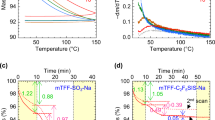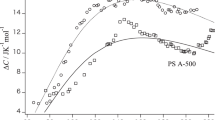Abstract
THE data of H. Isnardi1 show that the dielectric constant of carbon disulphide undergoes at the temperature of −90° C. a sudden change. This phenomenon appears at a considerably higher temperature than the freezing point of carbon disulphide (−112°); it is thus similar to ethyl ether. On the basis of our work on ethyl ether we may therefore suppose that the carbon disulphide undergoes at −90° C. a transformation from one liquid modification into another one.
This is a preview of subscription content, access via your institution
Access options
Subscribe to this journal
Receive 51 print issues and online access
$199.00 per year
only $3.90 per issue
Buy this article
- Purchase on Springer Link
- Instant access to full article PDF
Prices may be subject to local taxes which are calculated during checkout
Similar content being viewed by others
References
Zeit. für Phys., 9, 153; 1922.
M. Wolfke and J. Mazur, NATURE, 126, 684; 1930.
M. Wolfke and W. H. Keesom, Comm. Leiden, No. 190b.
Author information
Authors and Affiliations
Rights and permissions
About this article
Cite this article
WOLFKE, M., MAZUR, J. Two Modifications of Liquid Carbon Disulphide. Nature 127, 926–927 (1931). https://doi.org/10.1038/127926b0
Issue Date:
DOI: https://doi.org/10.1038/127926b0
This article is cited by
-
Change of Density of Carbon Disulphide with Temperature
Nature (1931)
Comments
By submitting a comment you agree to abide by our Terms and Community Guidelines. If you find something abusive or that does not comply with our terms or guidelines please flag it as inappropriate.



